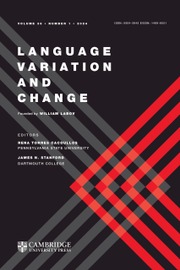Article contents
A sociophonetic account of onset /s/ weakening in Salvadoran Spanish: Instrumental and segmental analyses
Published online by Cambridge University Press: 22 October 2018
Abstract
In this study, we identify the linguistic and social predictors that condition onset /s/ weakening in speech data from sociolinguistic interviews with 72 Salvadoran Spanish speakers. In addition, we compare and contrast the explanatory power of instrumental and traditional segmental approaches. We find that the instrumental approach, which identifies flanking segments, stress, and region of origin of the speaker as conditioners of onset /s/ shortening and lowering of center of gravity, does not account for observed social variation in the data. Contrastingly, an ordinal logistic regression based on a combination of instrumental measures and perceived phonetic categories identifies flanking segment, region of origin, sex, and age of the speaker as predictors of onset /s/ weakening. We conclude that an exclusively instrumental analysis examining variation of onset /s/ thus obscures the potential social meaning of onset /s/ weakening in El Salvador.
- Type
- Research Article
- Information
- Copyright
- Copyright © Cambridge University Press 2018
Footnotes
Funding for data collection was furnished by the University of California, Los Angeles Ben and Rue Pine Research Travel Grant, awarded to both authors in 2015. We would like to thank the members of the University of California, Los Angeles Institute for Digital Research and Education statistical consulting group for their generous assistance with this project, the audience at the Eighth International Workshop on Spanish Sociolinguistics in San Juan, Puerto Rico, April 13–16, 2016, for their insightful comments, and five anonymous reviewers for their suggestions and feedback. Finally, we would like to thank our participants in El Salvador for their time.
References
REFERENCES
- 10
- Cited by


